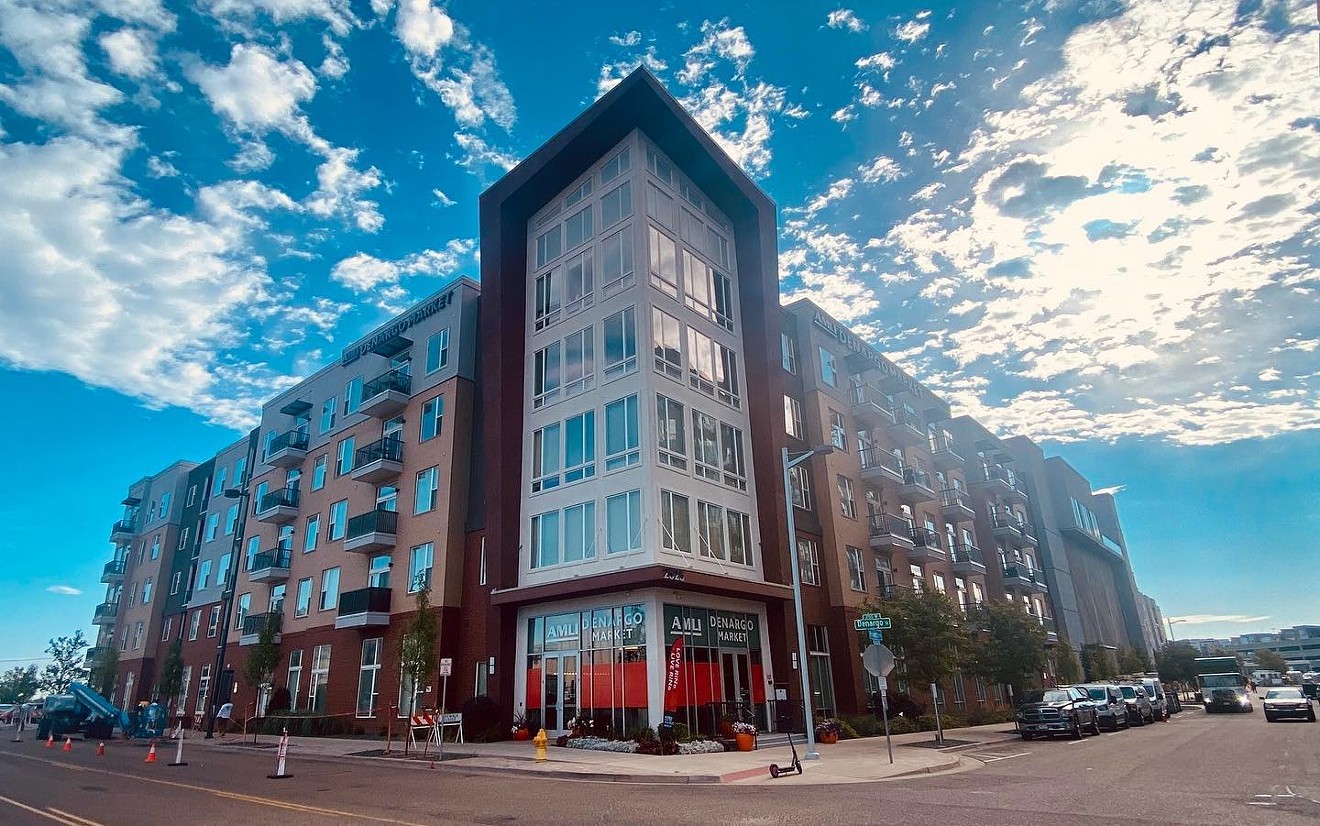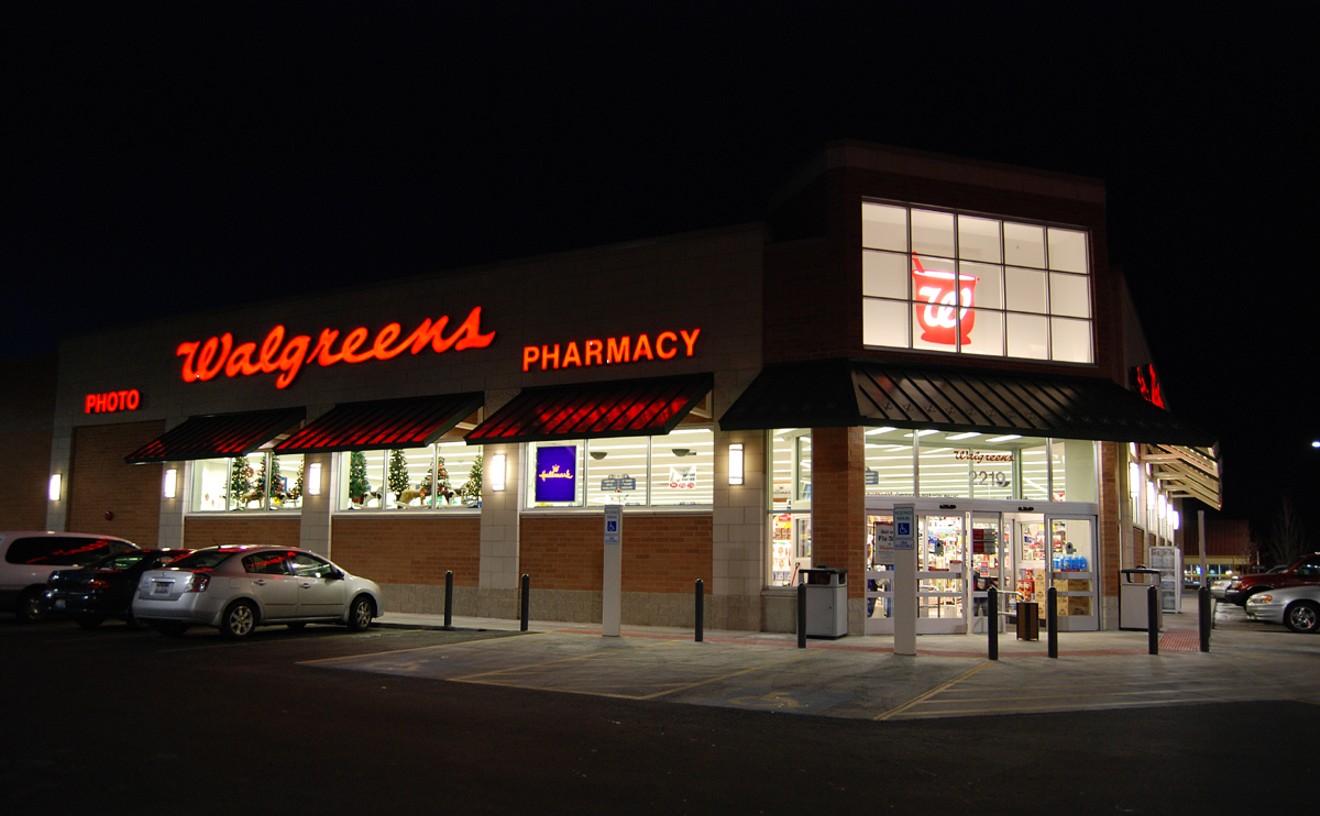The Denver Department of Excise and Licenses issued its first large-scale residential rental license for an apartment complex on July 21, to the 321-unit AMLI Denargo Market apartment complex at 2525 Wewatta Way. The license is a requirement of the Healthy Residential Rentals for All ordinance, passed by Denver City Council in May 2021 and designed to even the playing field between renters and landlords.
"We've got plenty of data that shows a lot of people live in rentals that do not meet our minimum housing standards in the City and County of Denver,” Denver City Councilwoman Stacie Gilmore told Westword in March, adding that she hoped the program will empower people in bad housing situations.
Denver estimates that there are at least 25,000 multi-unit properties that will need to be licensed by January 2023, but the city has only issued 131 rental licenses so far and has just another 56 applications under review. Single-unit rentals represent approximately 25,000 more properties that must be licensed by January 2024 under the program.
To try to incentivize rental-property owners to apply early, the department is cutting the price of application fees in half, from $50 to $25, through the end of 2022. In addition to the application fee, licenses will run $50 for a single dwelling unit, $100 for two to ten units, $250 for eleven to fifty units, $350 for 51 to 250 units, and $500 for 251 or more units. There is a fee exception for affordable or public housing properties.
Relatively few property owners have been moved by the incentive, though, and Excise and Licenses is concerned that there will be a rush in December. “Procrastinating is not going to pay off,” says Eric Escudero, director of communications for the Denver Department of Excise and Licenses.
Adding to the time constraints is the requirement that a property must be approved by a third-party inspector before the owner can submit an application for a license. The inspectors will be checking for rental standards set by the city under this program that include fire safety, pest control, building code, and proper water and room temperatures. All inspectors must be certified by the American Society of Home Inspectors, the International Association of Certified Home Inspectors or the Master Inspector Certification Board, as well as by the International Code Council.
At this point, there are only five inspection companies in the city that meet those requirements — and demand for their services is growing quickly, according to Chris Scott, growth director for Scott Home Inspection, one of the approved companies. Scott's business has experience with similar programs and has done inspections in Boulder for the past ten years as part of its residential licensing program.
According to Scott, Scott Home Inspection has inspected 400 units in Denver so far, accounting for 40 multi-family buildings and 150 single-family homes. For larger properties, the city requires that inspectors examine 10 percent of the units, along with utility rooms and entrances and exits.
“The inspection is a general health and safety inspection, so what we’re really looking for is anything out of the ordinary that could provide livability decreases,” Scott says. The most common issues involve faulty installation of smoke detectors, makeshift wiring, and plumbing problems that could lead to mold. Because of the age of some Denver housing stock, Scott says that basement units often have difficulty meeting egress requirements, which ensure that tenants can get out of buildings easily.
“Since the program is kind of in its early phases," he notes, "the people that are calling to get this completed are the landlords and managers that are on top of things, so the pass rate is pretty high right now.” He estimates that over 80 percent of the properties are passing on their first try.
If there are problems, property managers have ninety days to fix the issue before another inspection is done. If the problems are fixed by then, properties can apply for their licenses.
Scott, too, is worried about extra demand in December. Scott Home Inspection has already certified an additional inspector for this work and is considering certifying a third to try to get ahead of the impending rush of applications.
“I’ve noticed in the past month the calls have really started to pick up,” he says. “It was a couple a week, and now it’s multiple people every day. Things are really starting to ramp up, and you probably want to try to get in front of this before the end of the year, when all these multi-family units need to be ready.”
Healthy Residential Rentals for All also requires that the city create an accurate count of the properties that fall under the program. But in the meantime, in order for those properties to be in compliance by the deadline, Excise and Licenses is recommending that all owners start the process now before inspectors get overloaded.
Any multi-unit property not licensed by January 1, 2023, will be breaking the law — and at this rate, it looks like many could qualify as scofflaws.
[
{
"name": "Air - MediumRectangle - Inline Content - Mobile Display Size",
"component": "12017618",
"insertPoint": "2",
"requiredCountToDisplay": "2"
},{
"name": "Editor Picks",
"component": "17242653",
"insertPoint": "4",
"requiredCountToDisplay": "1"
},{
"name": "Inline Links",
"component": "18838239",
"insertPoint": "8th",
"startingPoint": 8,
"requiredCountToDisplay": "7",
"maxInsertions": 25
},{
"name": "Air - MediumRectangle - Combo - Inline Content",
"component": "17261320",
"insertPoint": "8th",
"startingPoint": 8,
"requiredCountToDisplay": "7",
"maxInsertions": 25
},{
"name": "Inline Links",
"component": "18838239",
"insertPoint": "8th",
"startingPoint": 12,
"requiredCountToDisplay": "11",
"maxInsertions": 25
},{
"name": "Air - Leaderboard Tower - Combo - Inline Content",
"component": "17261321",
"insertPoint": "8th",
"startingPoint": 12,
"requiredCountToDisplay": "11",
"maxInsertions": 25
}
]











